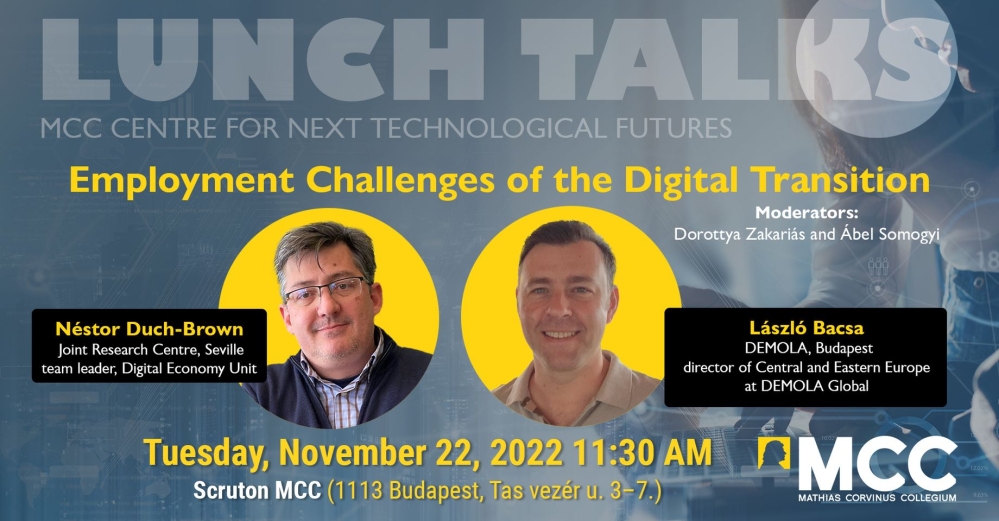Prof. Cséfalvay introduced the guest and the topic with the quote “You don’t have to run faster than the bear to get away. You just have to run faster than the guy next to you.” This is a perfect analogy for the Schumpeterian creative destruction and a superb quote to set the scene for the keynote speech entitled: Employment challenges of the digital transition.
In his presentation Néstor Duch-Brow, a senior researcher at Joint Research Centre of the European Commission, Seville, highlighted that although many thinks that the EU has an industry heavy economy, the share of employment in manufacturing in Europe is on a decline and employment is strongly concentrated around particular occupational groups. He also noted that unemployment is still high among young people, women and emerging countries, and that disparities in education are also striking, - those with lower qualifications have fewer opportunities to find work. Another indicator which tells a lot about our economic outlook is the share of wages compared to GDP. While in the last couple of years GDP, profit, interest rate and rent increased, the wages did not follow this trend, average wages stagnated and even declined.
After describing the current employment trends, Néstor Duch-Brown underlined the four main drivers of the digital transformation: automation, digitalisation, algorithmic management of work and new intermediation mechanisms. As an ordinary consumer, we can read many headlines about how robots will “steal” our jobs. The truth is, however, that machines have replaced tasks since forever, they helped us to avoid heavy, dangerous or tedious tasks. Now we are experiencing that is not just the physically heavy tasks that can be avoided and replaced, but algorithms as supplements to managers can also take a huge and unnecessary administrative burden off our shoulders.
There is a massive decline in information cost, which triggers a reorganisation of economic activities, thus resulting in the emergence of inverted firms. While in the 20th century there was a strong burden between the company and its environment, today the market is organised by the firms and the bulk of economic activities are outsourced to the market. This new era leads to new division of labour, therefore the researcher of JRC advocates a new labour market policy.
The keynote presentation was followed by a panel discussion with László Bacsa, the director of Central and Eastern Europe at Demola. During the discussion the panellists touched upon burning issues like “what skills are important to stay relevant on the job market”. Mr. Bacsa drew attention to the topic that most of the hard skill workers are not really team players and people who can work together are more likely to be hired. The truth is that hard skills can be taught more easily. Mr. Duch-Brown talked about the importance of going to university. Not because of the actual knowledge that is taught there, but because of the perspectives you can gain by studying and the ability to adapt these and learn quickly. These can be applied later on in the labour market, so that we can utilise the learning by doing method. Mr. Bacsa added to this thought that most technical university students do not know how to utilise the new technologies on the market, and they are not being taught for that. Teamwork is about working together with people who are experts in many different disciplines and not with other five engineers.
Talking about the future, both participants agreed that we need to forget the idea of older generations having a job for life and that policy makers need to address this new trend. Regarding future trends and implications, Mr. Duch-Brown claimed that digitalisation should and will disrupt the energy sector, while Mr. Bacsa added banking and insurance, energy distribution and storage to the list.
Keynote: Néstor Duch-Brown, Joint Research Centre, Seville(team leader, Digital Economy Unit)
Panelist: László Bacsa, DEMOLA, Budapest(director of Central and Eastern Europe at DEMOLA Global)
Moderators: Zakariás Dorottya & Somogyi Ábel
After graduating in economics and obtaining a PhD in philosophy and economics from the Universitat de Barcelona, Néstor Duch-Brown was a professor and researcher at the university for more than 15 years until he became interested in the job vacancies at the JRC in Seville. What started out as a two-year experience soon turned into an attractive career: gathering scientific evidence so that those responsible for policy decisions could do so with the best possible information. It also deals with topical issues, as digital technologies are affecting every aspect of our lives and will continue to do so in the future, given the trends we are seeing. His research focuses on the economic impact of e-commerce and digital platforms on the European economy. He has contributed with a large body of empirical evidence to legislative initiatives to combat geolocation in Europe and to the implementation of transparency requirements for large digital platforms.




